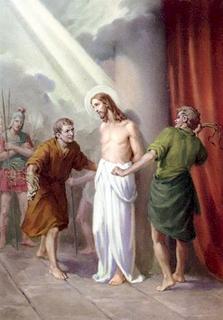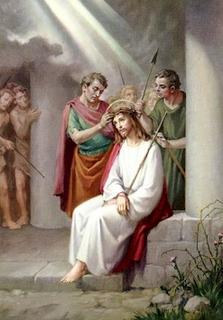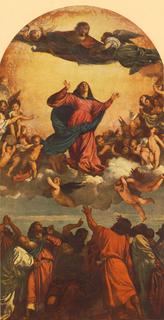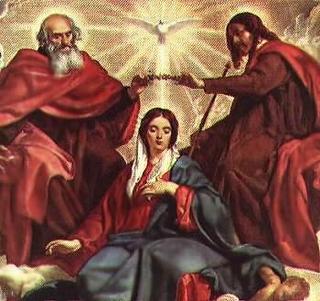
The Holy Rosary has been one of the popular Christian devotions for all time. Its recitation, especially during the month of October, has been recommended by popes and other devout men and women. What makes the rosary unique is that it combines vocal and mental prayers – we say the Our Father or Hail Mary and at the same time we reflect on the life of Jesus and Mary.
As a devotee, I have often prayed the rosary and find it effective in preparing myself for Mass. Some churches do spend a few minutes reciting it before the Eucharistic celebration begins. Others make it a part of the Holy Hour before the Blessed Sacrament. As we now approach the last leg of our celebration of the Year of the Eucharist, let us re-visit the life of our Blessed Mother as highlighted in the mysteries of the rosary and find out how we can participate in the Holy Mass like her.
The Joyful Mysteries
Recited every Monday and Saturday, these mysteries tell us the unravelling of God’s plan of salvation for the world in the person of Jesus. In these mysteries which convey gladness, Mary was chosen to play an important role.
The Annunciation
“I am the Lord’s servant…may it happen to me as you have said.” (Luke 1:38; TEV-2nd edition © 1992)

When the Archangel Gabriel announced to Mary her election as Mother of the promised Saviour, she was troubled, yet she humbly accepted what God had in store for her. In the Mass, do we humbly accept Jesus who comes to us through the proclamation of the Word and Holy Communion? How do we feel if we are asked to do the readings or offertory? Do we see ourselves in these ministries as superior to anybody else? Let us be live like Mary who acknowledged herself as the Lord’s servant. Only through genuine humility can we open our hearts to God’s presence and power and be able to see the Mass as a means of serving Him and His Church.
The Visitation
Mary got ready and hurried off to a town in the hill country of Judea. She went into Zechariah’s house and greeted Elizabeth. (Luke 1:39-40; TEV-2nd edition © 1992)

Mary did not keep the Good News to herself; filled with joy she reached out to her cousin who was in need. Our Masses are avenues where we can imitate Mary in reaching out to others through assisting visitors/new parishioners in church, shaking of hands during the Sign of Peace, serving in the choir or other ministry, and contributing to the weekly offering. Reaching out can also extend after the Mass. There are many Elizabeths out there in need of our help. Let’s share with them the happiness we’ve experienced in the Eucharist.
The Nativity of Our Lord
Mary remembered all these things and thought deeply about them. (Luke 2:19; TEV-2nd edition © 1992)

The image of Christ’s birth is very familiar. We see Mary tending her son and God. Joseph too was present to keep both Madonna and Child comfortable. Shepherds, who saw a host of angels announcing Jesus’ birth, came to pay homage too. Every Sunday and holyday of obligation, we come as a community to worship God and to receive His Body and Blood. Like Mary, let us also take time in the Mass to remember all the wonderful things that God has done for us in the past and think about what He wishes us to do for His Church. Let us be attentive in listening to the readings and paying attention to the different parts of the Mass. Be still in the presence of the Lord!
The Presentation of the Lord
So they took the child to Jerusalem to present him to the Lord. (Luke 2:22; TEV-2nd edition © 1992)

Mary and Joseph presented the Child Jesus in the temple to fulfil the law: “Every first-born male is to be dedicated to the Lord.” (Luke 2:23). His presentation to the Father is repeated in every Mass through the action of the priest and all those present. God has commanded His people to keep holy the Sabbath day (Sunday). Attending Mass on Sundays and other special days then is a must. Let us turn to Mary, the obedient Mother. With her, let us see to it that we always participate in the Holy Eucharist and offer Jesus to the Father for “the praise and glory of His name, for our good and the good of all His Church “.
The Finding in the Temple
“Your father and I have been terribly worried trying to find you.” (Luke 2:48; TEV-2nd edition © 1992)

For three days, Mary and Joseph have been looking for Jesus who, they thought got lost in the Passover Festival. To their amazement and relief, there He was sitting and discussing with Jewish teachers. Many times, we experience some sort of loss; we can’t find God in the events that happened in our life. We are not consoled or satisfied with the answers the world gives. We are like Mary who struggled in searching for her son till she found Him in the temple. Mary is giving her hand for us to hold. Let us cling to her as she leads us to church and point to us to the tabernacle where her very own son is present, always ready to listen to our pleas. Do you think of the Mass as a mere ceremony or a happy encounter with the Lord?
The Luminous Mysteries
Introduced in 2002 by then Pope John Paul II, these mysteries feature the public ministry of the Lord and are to be recited on Thursdays. Mary, who has been present in all the Joyful Mysteries, is now overshadowed by her son. There is, however, one instance where we can clearly see her role in Christ’s mission as “Light of the world”.
The Baptism of Jesus
“This is my own dear Son, with whom I am pleased.”(Matthew 3:17; TEV-2nd edition © 1992)

Through Baptism, we have been adopted by God as His own children; we share in the very life of Jesus His Son. This is very much evident whenever we say the Lord’s Prayer. We never call God, “My Father”, but “Our Father”. Some communities even hold hands while this beautiful prayer is said or sung. In spite of our diversity in background or race, we gather in one table to partake that one bread which Our Father lovingly gives us. The Blessed Virgin is one with us in invoking this prayer, a prayer that she has practiced all her life. If we call God as Father, do we look at our fellow churchgoers as our brothers and sisters?
The Wedding Feast of Cana
“They are out of wine.”(John 2:3; TEV-2nd edition © 1992)

This mystery shows us the first instance Jesus performed a miracle. After discovering that there was no more wine, Mary asked the Lord to spare the newly-wedded couple from embarrassment. Though it wasn’t time for Jesus to do wonders, He approved her request. In our Eucharistic celebration, we always spend time in presenting various petitions to God – for the Church, the world, those in need, our community, and our personal intentions. In our participation, let us imitate Mary who went out of her way making intercession for others. We must also take heed of what she said to the servants during this occasion: “Do whatever he tells you.” (John 2:5) Our obedience to Christ should be the essence of our devotion to Mary. We do these full of conviction in the saying “Ad Jesum per Mariam” (To Jesus through Mary).
The Proclamation of the Kingdom of God
“Turn away from yours sins, because the Kingdom of heaven is near.”(Matthew 4:17; TEV-2nd edition © 1992)

The Mass has always been described as holy. Indeed, it is instituted by God for the benefit of His chosen people. Hence, at the Introductory Rite of the Mass we are called to recall and be sorry for our sins. The key to God’s kingdom is conversion. Have we been open to His call for conversion at the beginning of every Eucharistic celebration? Have we listened to His invitation to make peace with others before receiving His holy body? Let us turn to Mary who has consistently been attuned to God’s commands. Once we regard her son’s call, we can truly find the Mass reinforcing grace in us, making us more resolved to proclaim a change of heart in a society totally in need of God.
The Transfiguration
As they looked on, a change came over Jesus: his face was shining like the sun, and his clothes were dazzling white. Then the three disciples saw Moses and Elijah talking with Jesus. (Matthew 17: 2-3; TEV-2nd edition © 1992)

In the Lord’s transfiguration, Jesus gave Peter, James, and John a foretaste of His glory. St Peter was filled with awe as he witnessed his Master robed in glory. We can also be like the apostles, marvelling at this mystery. Then suddenly, reality comes again. We face trials of every sort as individuals and citizens of the world. This is part of our pilgrimage on earth. At some point, we struggle or falter. Mary bids us to receive her son, the Bread of Life. He is our abiding light through the dark and long tunnel of life.
The Institution of the Eucharist
Then he took a piece of bread, gave thanks to God, broke it, and gave it to them saying, “This is my body, which is given for you. Do this in memory of me.” (Luke 22:19; TEV-2nd edition © 1992)

Every person has a reason attending Mass. Some of us do it out of obligation. Others ask God to answer their petitions. Still others may have recalled the blessing of another year, of good health, of a successful career. Lest we forget, God too blesses us in the same celebration with the body and blood of His Son; a body broken to make us whole, blood poured out so we can be counted among His people. Jesus calls us to attend Mass in remembrance of Him. “Gratitude is the heart’s memory” so goes a saying. Have we been grateful of the Lord’s stupendous gift of Himself? If we are tempted to think of the Mass as a mere routine, let us Christ saying: “Do this in memory of me.” We pray to Mary, model of us all, to teach us how to become thanks givers.
The Sorrowful Mysteries
These mysteries show us the Lord’s Passion and Death. When we reflect on these every Tuesday and Friday, there is an air of sadness for the horrible suffering Christ underwent for us sinners. Mary was one in her son’s pains. She continues to be the Sorrowful Mother of those who suffer.
The Agony in the Garden
“Father, if you will, take this cup of suffering away from me. Not my will, however, but your will be done.”(Luke 22:42; TEV-2nd edition © 1992)

When Jesus was about to be handed over to the elders, He sweated blood as he feared imminent death, but He trusted God in His mission. The Mass is the highest form of prayer. When we pray, do we behave like Jesus? Are we attentive throughout the Mass? Do we really mean when we say “Thy will be done on earth as it is in heaven”? Let’s turn to Our Lady that we may have a heart that seeks God’s own heart.
We are healed by the punishment he suffered, made whole by the blows he received. (Isaiah 53:5; TEV-2nd edition © 1992)

We can only imagine how the Lord was scourged by Pilate’s men. The prophet Isaiah perceives Jesus’ scourging as a balm for our own wounded selves. In the Mass, God grants us pardon after we humbly confess our sins and resolve never to sin again. Before Holy Communion is distributed, we ask the Lamb of God for peace which the world is in dire need of. For Mary, it was a heart-rending experience to see her son bruised and beaten. Yet she relied on God and was healed of any ill-feelings against Jesus’ tormentors. We commend ourselves – bruised and beaten at some point in our lives - to her that we too may experience healing from Jesus, the Wounded Healer.
They put a purple robe on Jesus, made a crown out of thorny branches, and put it on his head. (Mark 15:17; TEV-2nd edition © 1992)

Jesus was mocked by the pagan soldiers by dressing and crowing him like a king. Yet He did not do or said anything to them. In our times, we still see the Lord being mocked by His so-called followers. There are those who say they are Catholics, but do not go to church at all. We can also be part of those who mock Christ through our own lapses. Whenever we attend the Holy Eucharist, we oftentimes recite the Creed. Let us feel the power of those wonderful words of faith in God – Father, Son, and Holy Spirit. The Creed is our pledge of loyalty to our King. Let’s prove to the world that we are not “Sunday Christians” only.
The Carrying of the Cross
He went out, carrying his cross, and came to “The Place of the Skull”, as it is called. (John 19:17; TEV-2nd edition © 1992)

During the Lord’s public ministry, He often told his followers that unless they carry their cross they are unfit to be His disciples. Indeed, in this mystery we realize how Christ was made to carry the cross to His place of execution. Sadly, His followers have all deserted Him. Yet He carried on what His Father planned Him to accomplish. Every one carries a cross – problems, challenges, responsibilities, etc. As Christ’s followers we courageously carry our cross knowing that we will also triumph like our Saviour. In the Mass, let us unite ourselves with Mary who met her Son on the way to Calvary. As He consoled her during that sad encounter, He will also do the same to us. He comes to nourish us in Word and Bread that we may persevere till the end.
Jesus saw his mother and the disciple he loved standing there; so he said to his mother, “He is your son.” Then he said to the disciple, “She is your mother.”(John 19:26-27; TEV-2nd edition © 1992)

As Jesus was about to die on the cross, His last will and testament was for His mother to be the Mother of His people. The Mass brings back to mind Jesus’ atrocious death on the cross. As we recall His self-oblation, let us be grateful for the immense love that God has for us sinners that He willingly died so that we might live. Jesus’ love was so great that He gave us His mother to be our own. Like Mary, let us obey Christ’s final instructions. Let us take her into our hearts and our homes. As our mother, she will inspire us to live like Christ, a Man for others.
The Glorious Mysteries
The once sorrowful followers of the Lord have become witnesses of God’s triumph over sin and death as depicted by these mysteries. When we reflect on these on Wednesdays and Sundays, let us take courage like Mary – Jesus has overcome the world.
The Resurrection
“Do you believe because you see me? How happy are those who believe without seeing me!” (John 20:29; TEV-2nd edition © 1992)
If the Jews celebrate the Lord’s Day on a Saturday, we observe it on a Sunday because Jesus rose from the dead on that day. When we gather at Mass we celebrate it in such a way that we are full of life, a life that Christ has won for us. At the proclamation of God’s Word, we must be fully aware that God speaks to us in the person of the reader. We then joyfully respond “Thanks be to God.” Whenever we say the “Amen” at Communion, it must come out of our conviction that we are receiving God indeed. We may not have seen Him like St Thomas and the rest of the apostles, but we are convinced that He is with us. May Mary support us in observing our Sunday worship, our act of faith to our faithful God.
The Ascension
“And I will be with you always, to the end of the age.” (Luke 28:20; TEV-2nd edition © 1992)
These were the assuring words of our Lord before He went back to the Father. His followers through the years have never been left orphaned because through the Breaking of the Bread He makes Himself present. From Monday to Friday (or even Saturday), we have kept ourselves engaged in our work. On Sundays, we set aside our usual concerns and turn to God in church. This has been our practice every week. In the Mass we thank God for guiding us in the past and ask Him to be with us in what is about to happen. Even if know little of what will become of us in the coming week, we are full of hope. Though we have been given talents and skills to use, we continue to seek the power from above so we can utilize our efforts wisely. With Mary let us approach the Eucharist, saying: Jesus I trust in you.
The Descent of the Holy Spirit
They were all filled with the Holy Spirit. (Acts 2:4; TEV-2nd edition © 1992)
The Mass is the action of God for the benefit of His people. Through the inspiration of the Holy Spirit, people do their part in the celebration. The priest leads us in prayer and consecrates the bread and wine into our Lord’s body and blood. The choir facilitates in the singing of various hymns. The readers proclaim God’s message as contained in the Sacred Scriptures. The special ministers assist the priest in distributing Communion to all present as well as to the sick that are housebound. If God’s Spirit enabled these ordinary men and women to serve in the holiest of celebrations, He can also do the same to you. Ask the Blessed Virgin for guidance on how to be open to His power so you too can share your time or talent or treasure for the growth of the community.
The Assumption of Our Lady
From now on all people will call me happy because of the great things the Mighty God has done for me. His name is holy; (Luke 1:48-49; TEV-2nd edition © 1992)
Mary, who was immaculately conceived in the womb her St Anne, was taken up body and soul into heaven. She is truly the “happy mother, virgin blest”. Mary has described God’s name as holy and during her pilgrim on earth she led a holy life in response to God’s call for His people to be holy like Him. We too are given the chance to be holy. Now is the time for us to examine ourselves: Have we put into action what we have gained from the Mass? Are we truly in the state of grace to receive Jesus’ body? Have we dressed properly for our worship? Have we been to confession to ask pardon for our offences? It has been said that the Mass is one of the keys in going to heaven. Mary got herself ready to become the mother of Christ and His first disciple. When she died God deemed her fit to be in heaven. God too can do wonders for us; heaven can be our final destination if we follow our Mother’s example.
The Coronation of Our Lady
Then a great and mysterious sight appeared in the sky. There was a woman, whose dress was the sun and who had the moon under her feet and a crown of twelve stars on her head. (Revelations 12:1; TEV-2nd edition © 1992)

God, who cannot be outdone in generosity, has crowned Mary – a human being like any of us – as Queen of all creation. Having lavished her with this title, she intercedes for us before the throne of the Almighty Lord like Queen Esther and Judith, two famous women of the Old Testament. Esther asked King Xerxes to spare her and her people from annihilation. Judith killed Holofernes who planned to crush the Israelites. Nowadays, mankind is faced with destruction of family, values, and faith. As Queen, Mary has visited and reminded us of how grave these new forms of annihilation are through her apparitions in Fatima. She calls us to return to God lest we face chastisement from His Divine Justice. In these same apparitions, she assured her seers “Finally, my Immaculate Heart will triumph.” As her children and subjects, are we ready to join in her battle against evil? Let the Mass be our way of preparing for war. Our Lady will never abandon us.
Conclusion
We have meditated the many events in the life of Mary in union with her son Jesus; events that in one way or another point to the value of the Holy Mass and how we can benefit from this. It goes without saying that the rosary should never be prayed during the Mass. For the Mass is the highest form of prayer. As we continue to say the Hail Mary whilst clutching the beads of this sacred object, we ask Our Lady to support us in cultivating a deeper awareness and love for the Eucharist. With her, let us then celebrate the Mass with all the fervour that we can muster.
Pietro Bernardino S Albano
Mass reader, Our Lady of Perpetual Succour Parish (Bulwell, Notingham)
Member, Confraternity of the Rosary

No comments:
Post a Comment